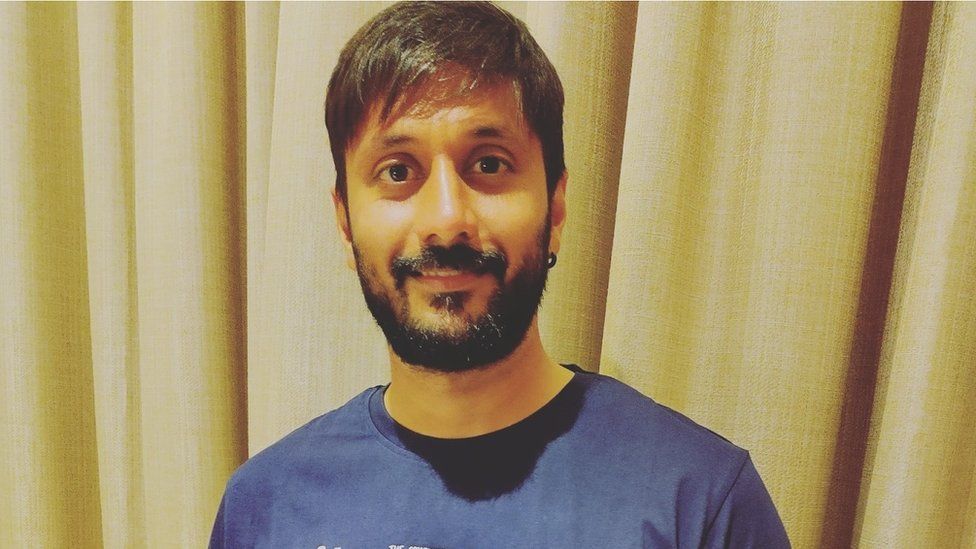An Indian actor has been arrested for tweeting against one of the judges hearing pleas against a ban on Muslim girls wearing hijabs in schools.
Chetan Kumar was arrested in the southern state of Karnataka after he criticised Justice Krishna Dixit.
The actor wondered why a judge, who has made “disturbing comments” in the past, was hearing the contentious matter.
He was referring to a 2020 order in which the judge had questioned the behaviour of a woman who alleged rape.
Justice Dixit’s comments were later deleted from the order after they resulted in outrage and were described as regressive.
Mr Kumar’s arrest has sparked anger, with many questioning the police’s motive.
A US citizen and a Fulbright scholar, Chetan Kumar is a firebrand Dalit (formerly known as untouchable) rights activist who has been involved in several anti-right wing protests in Karnataka.
Critics say he’s often targeted for his social work – the actor is already facing two police complaints for his remarks against the Brahmin community, who are at the top of India’s Hindu caste hierarchy.
On 16 February, Mr Kumar’s tweet referred to a rape case in which Justice Dixit had granted anticipatory bail to the accused after observing that the woman’s statement was “a bit difficult to believe”.
“The explanation offered by her that after the perpetration of the act she was tired and fell asleep is unbecoming of an Indian woman,” the judge had said in 2020, adding that it was “not the way our women react when they are ravished”.
Sharing a screenshot of the observations, Mr Kumar wrote: “Justice Krishna Dixit made such disturbing comments in a rape case. Now this same judge is determining whether hijabs are acceptable or not in government schools. Does he have the clarity required?”
This is a tweet I wrote nearly two years ago regarding a Karnataka High Court decision
Justice Krishna Dixit made such disturbing comments in a rape case
Now this same judge is determining whether #hijabs are acceptable or not in govt schools
Does he have the clarity required? pic.twitter.com/Vg8VRXmJTW
— Chetan Kumar Ahimsa / ಚೇತನ್ ಅಹಿಂಸಾ (@ChetanAhimsa) February 16, 2022

Police in Bengaluru city took notice of Mr Kumar’s tweet and charged him with “intent to incite a class or community to commit offence” and “intentional insult with intent to provoke breach of the peace”, according to ANI news agency.
Police added that the actor would be produced before a judicial magistrate, but did not specify when.
Mr Kumar’s wife Megha said in a live chat on Facebook that the actor “had gone missing from the house”, according to The News Minute. “No one informed us [about his arrest], his phone is switched off, so is our gunman’s [bodyguard],” she alleged.
Many expressed their anger over Mr Kumar’s arrest.
Senior journalist Dilip Mandal asked why the actor was being punished for his comments.
कन्नड़ फ़िल्मों के एक्टर @ChetanAhimsa ने जज दीक्षित की इस बात का विरोध करते क्या ग़लत कर दिया कि आज उन्हें गिरफ़्तार कर लिया गया? दीक्षित ने अपने फ़ैसले में लिखा था कि – “रेप के बाद सो जाना भारतीय महिलाओं को शोभा नहीं देता!” #Jaibhim_ChetanAhimsa pic.twitter.com/k50GW2fEuv
— Dilip Mandal (@Profdilipmandal) February 22, 2022

Another social media user called the police action outrageous and said the country had “hit rock bottom” with Mr Kumar’s arrest.
Arresting @ChetanAhimsa for calling out misogynistic remarks by a High court judge clearly shows that we have hit rock bottom. This is outrageous and must be condemned strongly and widely. #jaibhim_ChetanAhimsa
— Shaileshwar Yadav (@Shaileshwar21) February 22, 2022

In India, criticism against the judiciary can often land you in jail. In 2021, the country’s top investigative agency, the CBI, had arrested five persons for allegedly making derogatory posts on social media platforms against judges and the judiciary of a high court.
The country also has some of the world’s strictest contempt of court laws. In 2020, prominent Indian lawyer and civil rights activist Prashant Bhushan was found guilty of contempt of court after the Supreme Court found two of his tweets derogatory.
Additional reporting by Imran Qureshi

Read our coverage of elections in India:





























